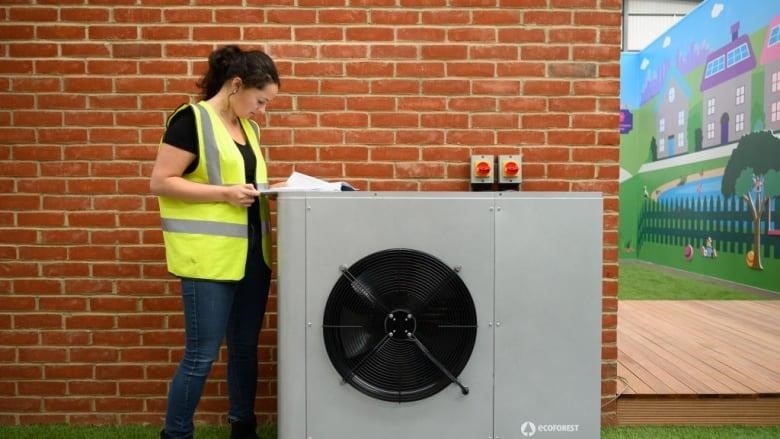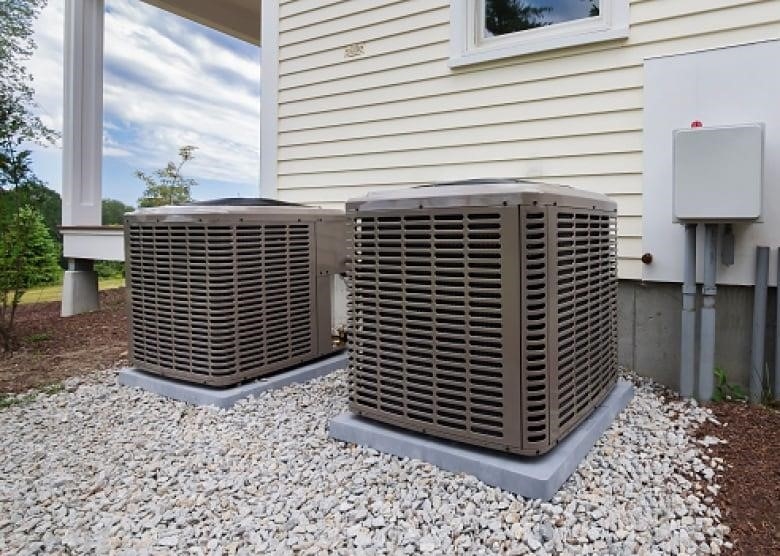
We’ll answer your questions about how to keep your home cool and smoke-free
Many people in British Columbia are looking for ways to keep their homes cool and smoke-free during this wildfire season, which has been the worst on record.
Since the deadly heat dome that hit B.C. in 2021 and killed hundreds of people between June 25 and July 1, portable air conditioners are often sold out, and heating and cooling companies in B.C. say they’ve been inundated with requests to install energy-efficient heat pumps.
D’Arcy Michiel, who owns Salix Energy Advising in Prince George, said, “We get a lot of interest from people who are looking into heat pumps.” “They can make your house feel very cold.”
Heat pumps can be a good choice for many people, but depending on your home, your budget, and where you live, they might not be the best choice.
Here are some answers to the questions you may have had about the cooling option.
What is a heat pump
Heat pumps are electric heating and cooling systems that can be up to three times as efficient as furnaces or electric baseboard heating systems.
They use the same system as refrigerators, freezers, and portable air conditioners to take heat from one place and move it to another. They don’t make heat on their own.
This means that heat pumps can cool homes in the summer and warm them in the winter.
Joe Cherieux, who owns Controlled Air Heating and Cooling in Courtenay, told CBC that a heat pump or air conditioner works the same way, but it also heats your home.On The Coast last Thursday.
Air-intake heat pumps pull heat from the air outside to warm homes or pull heat from inside and send it outside to cool a home.
Ground-source heat pumps pull heat from a heating loop that is buried deep in the ground. When the cooling mode is turned on, the heat is pushed back out into the air.
How cool or warm can they make my house
Heat pumps have gotten better over the past few years, but Michiel says they might not be the best choice for homes in places where it stays below -20 C all the time.
Traditional air-intake heat pumps work best in warmer places like the coast of B.C., but Manitoba Hydro says you shouldn’t use them in temperatures below -10 C.
Michiel said, “As it gets colder, they won’t be able to heat the house as well.”
Martin Kegel, an engineer who leads heat-pump projects at Natural Resources Canada’s CanmetENERGY research centre, told CBC that on extra cold days below -30 C, it’s best to have a backup heat source like a furnace, fireplace, or baseboard heaters.
One manufacturer says that newer cold-climate heat pumps can work well down to -30 C and below, so they might be a better choice for parts of the north of the province.
Ground-source, or geothermal, heat pumps work even when the temperature above ground drops below -30 C. This is because the heat sources they use stay above freezing all year in most of Canada, just like they do in Sweden, where they are very popular.
Michiel says that heat pumps are usually “straight-across positive” if a home already has electric baseboard heating and wants to save money on heating and keep the place cool.
“If you have electric baseboard heat and don’t have ductwork or anything like that in your house, a heat pump is the way to go.”
Do heat pumps keep smoke from wildfires from coming into my house
Air-intake heat pumps can be fitted with a filter to get rid of the small particles in wildfire smoke that cause breathing and heart problems, especially in young children and older people.
Pollutants can also be taken out of the air by filters in portable electric air filters and air conditioners. However, these filters need to be cleaned often to make sure they are still working properly.
But making your home as airtight as possible with new windows, door frames, sealing exposed concrete walls, and replacing attic insulation helps keep the heat and smoke out in the first place.
Michiel says that these changes will also make homes more energy efficient, whether you want to heat or cool them.
How much do heat pumps cost
The cost of the pump itself can range from $6,000 to $12,000, depending on the type, how well it works, and how big the house is.
Installation labor costs also depend on what, if any, changes need to be made to the home’s electrical system to make room for the heat pump or to connect it to a backup heating source.
Cherieux says that installation costs between $10,000 and $20,000, depending on how hard it is, how old the home is, and what kind of heating system is already there.
He also said that it can take a lot of work to make sure that all the units in condos and stratas are connected and that the electrical grid doesn’t get overloaded.
Geothermal heat pumps are much more expensive to put in because they need to be buried deep in the ground and are usually meant to serve more than one home so that the cost can be split.
How do I qualify for rebates
Rebates are available for heat pumps from the province, the federal government, and some cities and towns.varyDepending on how big the house is, how old it is, and what kind of heating system is being replaced.
British Columbians can get up to $11,000 back if they replace their furnace with a heat pump.System to heat with oil or propaneAs part of a set of programs meant to cut down on the use of fossil fuels.CleanBC, FortisBC. and the Canada Greener Homes Grant.
B.C. Hydro and the federal government will give up to $7,000 to people who replace an electric heating system like baseboards, radiant ceiling, or floor heating.
All rebates from the provinces and the federal government can be applied for throughB.C. Hydro.

Many cities and towns, like Vancouver, have their own rebate programs and require homeowners who need a new furnace to put in heat pumps.
But heat pump rebates are not available to strata owners, renters, or owners of buildings with more than one unit.
Before work can start, applicants for federal and provincial rebates must make sure they have applied for the rebate and had a certified energy assessment done. They can ask for an assessment by going to their federallylocal service organization.
Michiel said that both pre- and post-assessments can cost about $900, but there are rebates for about $600 of that cost.
Before buying a heat pump, it’s important to read the details of each rebate and talk to a certified installer or energy advisor, he said.
Not all Houses and heat pumps qualify., and the installation must be done by aHPCN stands for Home Performance Contractor Network. to qualify for the rebates.
Michiel said, “There’s a lot of small print.”
WATCH | The Canadian government has announced a grant to help people switch to heat pumps:
What are my other options
Michiel says that a heat pump might not be the most cost-effective choice if your furnace is still working well or if you live in a colder area and need a backup heating system for very cold days.
He said that buying a portable air conditioner, which start at around $500 each, for one or two rooms in the house could save money compared to installing a heat pump before the furnace needs to be replaced.
But the initial cost of a heat pump can be worth it for people who want to reduce their carbon footprints and cool their homes in milder coastal climates, where the pump’s energy costs are about the same as gas prices.
Michiel says to talk to a professional about what will work best for your home, your needs, and your budget.
WATCH | Heat pumps are becoming more popular in the Atlantic provinces:
Michiel said that portable air conditioners are also a good choice for people who live in smaller homes or rent. Those who buy a qualified portable air conditioner that uses less energy can get a$50 rebate from B.C. Hydro.
In a similar program, the province is also paying for 8,000 portable air conditioners forBritish Columbians with low incomes and who are at risk.
Heat recovery ventilators can be put in homes with vent heating to take heat from moving air and send it either inside or outside.
Natural Resources Canada says that if the right filters are used, they can also clean the air of pollutants like smoke from wildfires.
Cherieux and Michiel said that people who live in smaller homes or rent can keep cool without spending a lot of money if they fix the seals around their windows and doors, tint their windows, and close their blinds.
“These will be the easiest things for you to do,” Michiel said.
